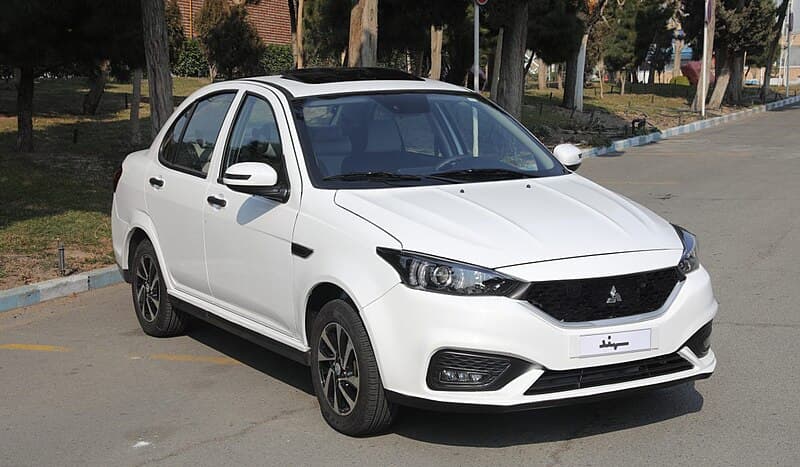Iran’s Auto Industry, Buoyed by Sanctions, Finds a Potential Customer in North Korea
Outcast nations look for a deal that would ‘highlight the ineffectiveness of sanctions.’

Add motor vehicles to the military ventures that are fueling relations between North Korea and Iran. The latter’s second largest motor vehicle maker, Saipa, may be picking up where the Reverend Sun-myung Moon’s Unification Church gave up 11 years ago as a North Korean car maker.
That’s the upshot of a visit by North Korea’s minister for external economic relations, Yun Jong-ho, to Tehran, where he was photographed in a Saipa car during the first mission by a North Korean trade delegation to Tehran in five years, North Korea might well “cooperate in the automotive industry given favorable bilateral political ties,” according to a posting on Saipa’s Instagram account as quoted by the South Korean newspaper, JoongAng Ilbo.
Pyeonghwa, for “Peace,” netted several hundred thousand dollars in 2009 and 2010, according to the website chinacarhistory.com. The Unification Church, having shared ownership with North Korea, got out in 2013 after producing a few hundred cars a year — fewer than South Korea’s Hyundai empire churns out worldwide in half an hour.
Saipa between 1993 and 2020 had a deal with South Korea’s Kia Motors, owned by Hyundai, for making offshoots of the Kia, according to carscoops.com. Iran’s Financial Tribune also reported on Saipa’s deals with Japan’s Nissan and China’s Brilliance.
Iran cars also face “serious safety failures and quality issues,” according to the Financial Tribune, reporting its most popular car “remains distinguished by its ultra-low quality.” The Israeli newspaper Haaretz, blaming Iranian cars “for the high numbers of traffic accidents,” blasted the Saipa Pride as “Death Trap.”
South Korea’s unification ministry charges that any deal between Iran and North Korea would be a violation of UN sanctions, which both Iran and North Korea ignore, according to Seoul’s Yonhap News. While UN sanctions keep foreign cars out of the Iranian market, leaving no choice but to buy Iranian cars, North Korea might assemble cars for Saipa or produce them for its own elite.
Regardless, cooperation between North Korea and Iran would be “limited in both economic scale and technology,” a researcher at Seoul’s Korea Institute for National Unification, Chung Yu-seok, told JoongAng Ilbo. The deal, he said, would “highlight the ineffectiveness of sanctions.”
The deal would also reveal the potential of Iran-North Korean cooperation beyond missiles and nuclear warheads. As a nuclear power, North Korea has advised the Iranians on their nuclear program, which is coming close to producing its first warhead, and has exported missiles to Iran, which Iran now makes on its own.
While focusing on nukes and missiles, North Korean non-military manufacturing is another story. A North Korean state company produces trucks, some of which run on burning wood and charcoal, but the former Pyeonghwa plant in North Korea’s west coast port of Nampo would probably be used for making Saipa cars.
It’s not likely that North Korea at this stage could make the powertrain, engines, and transmissions for reliable mass production, but the plant could begin with CKD or complete knockdown sets in which vehicles are assembled from components made elsewhere — in this case, Iran.
The record of Pyeonghwa reflects the weakness of North Korean industry in fields other than missiles and other weaponry, including artillery shells that the North ships to Russia for the war in Ukraine.
The company “was very far from being in any way relevant other than as a diplomatic tool,” according to carscoop.com, despite “a production capacity of 10,000 units per year.” Pyeonghwa’s output sank to 314 cars in 2003, it said.
Iran’s record in manufacturing cars is another story.
“In recent years, the Iran automobile market has experienced a significant boost, owing to the burgeoning sales of passenger cars,” according to an Indian research firm, Mordor Intelligence. “This surge in demand for passenger vehicles has contributed to the automotive industry’s expansion and positively impacted the country’s overall economic landscape.”
The Mordor report said Iran in 2022 produced 997,520 passenger cars, an increase from 2021 due to “rising disposable income” and “increasing urbanization and changing lifestyles” — that Iran is ready to bestow on its de facto ally, North Korea.

